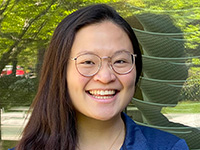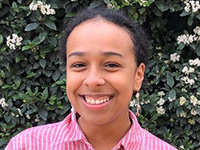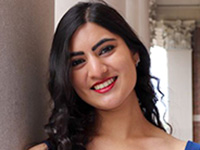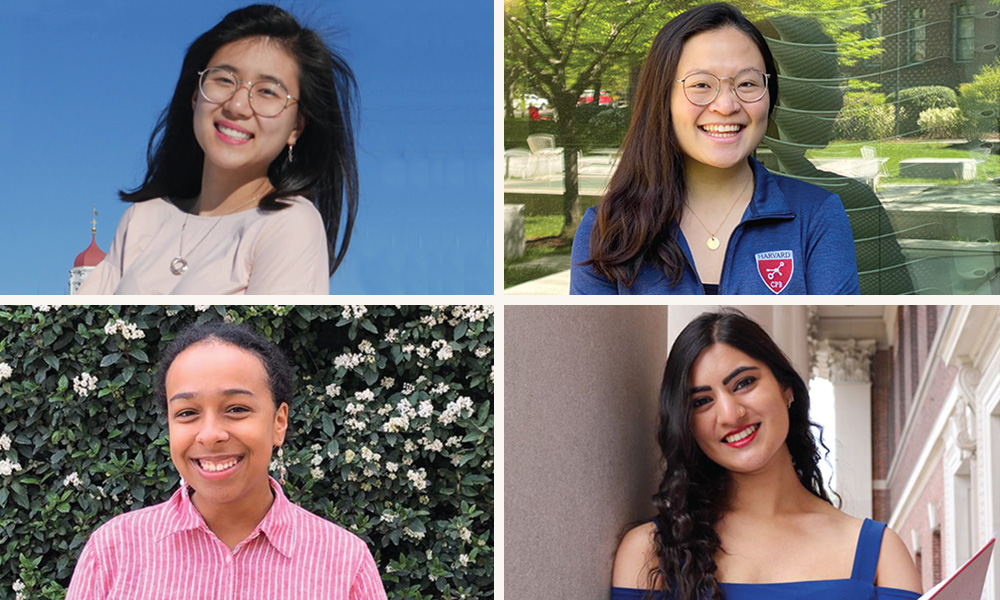Four seniors from the Neuroscience and CPB concentrations have been chosen as recipients of scholarships and grants through various branches of the Fulbright U.S. Student Program.
These four seniors—Serin Baek (CPB ‘21), Connie Cai (CPB ‘21), Anabelle Paulino (Neuro ‘21), and Saher Siddiqui (CPB ‘21)—will travel overseas to pursue individual projects that foster cultural exchange and further their professional growth.

Serin Baek
CPB concentrator Serin Baek is headed to Yunlin County, Taiwan, where she will work as Fulbright English Teaching Assistant at an elementary school in a rural community. “I want to work in pediatrics in the future, so this program will give me a great experience interacting closely with young kids and learning how to be a supportive mentor for them,” Baek says.
The teaching assistantship ties into Baek’s volunteer work with ELL (English Language Learner) students through the Chinatown Afterschool Program, where she has been working with young Mandarin-speaking students since her first year at Harvard.
Baek’s goals for her time abroad also include starting a STEM club at the school.
Though the past academic year has been a challenge, Baek says she is looking forward to the coming year. “I struggled a lot with keeping myself motivated and productive, but receiving this fellowship has been very encouraging for me,” she says. “I’ve learned a lot about myself and have also grown a lot over this past year. I can’t wait to show this growth during my fellowship and in the next few years coming out of the pandemic!”
She expressed gratitude to the CPB and MCB community at Harvard. “I want to first thank all the faculty and staff in MCB/CPB. I am really grateful for the conversations and guidance that Dominic Mao, Irina Cashen, and Rachelle Gaudet have provided me. I also want to thank all my friends and peers in the community for all their support and encouragement. The Neuro and MCB community is always so uplifting! I would like to encourage and recommend underclassmen to try applying for fellowship opportunities as well.”

Connie Cai
CPB concentrator Connie Cai will also pursue an English Teaching Assistantship, where she will be working with middle school students in the city of Hualien, Taiwan.
“From being an English language learner myself to becoming an English language educator, I have experienced firsthand the importance of inclusive classrooms that value and celebrate different stories, identities, and perspectives,” Cai says. “Through the Fulbright program, I hope to continue this work but also to adapt it, by learning from a new community of students and educators.”
“Ultimately, my goal is to create more equitable and accessible systems of education and cultural diffusion,” she adds. “I was given the opportunity, as a child of immigrants to the United States, to grow up in two different cultures––an experience that has fundamentally shaped my identity and who I am today. Through the Fulbright, I want to share my experience with others, but most importantly, I hope to create widespread cultural and language exchange.”
Cai’s interest in the brain’s plasticity has fueled her interest in education. “As a CPB concentrator, I conducted research on stem cells and neural development, working to understand the biological mechanisms governing how we learn and develop neural circuitry; as an education minor, I studied how cultural and historical norms shaped how we learn,” she says. “Both of these perspectives will shape how I plan to teach my students.”
She adds that being part of the MCB and CPB community has taught her to be interdisciplinary. “Thank you for encouraging me to not just learn about science, but to think more broadly about how science can impact lives and shape people’s perspectives,” she says.
Another enduring lesson from studying life sciences during a pandemic has been the importance of outreach. “This past year has shown me that not only should I learn science for the sake of learning science, but also that it’s important that I use that knowledge to help my community,” Cai says. “I am grateful for this lesson, and I will take it with me wherever I go.”

Anabelle Paulino
Neuroscience concentrator Anabelle Paulino has received a Fulbright Open Research Grant that will enable her to research associations between PTSD and criminality at the Karolinska Institutet in Stockholm, Sweden.
“There are definitely connections between mental illnesses and criminality, especially in the context of the US prison system, but there is currently a gap in the scientific literature when it comes to PTSD and criminality,” Paulino says. “With this project, my goal is to not only help address this gap in the literature, but also to generally raise awareness to the connections between mental illnesses and criminality.”
Paulino adds that she has appreciated the versatility of the Neuroscience concentration. “I have been able to explore several different aspects of neuroscience, from studying some of the neural underpinnings of mental illnesses to learning about biological processes of spinal cord injuries,” she says. “This flexibility has helped inspire me to apply neuroscience to different academic contexts, and I’m excited to explore more ways to do so!”
During the pandemic shutdown, Paulino made a point of reaching out to professionals in neuroscience and public health and asking them about their careers. “Talking to several professionals both within neuroscience and public health throughout the past year has helped me figure out how neuroscience actually can be present in different fields through different ways.” she says.
Paulino says she is thankful for the Neuro and MCB community at Harvard. “I wanted to thank my advisor, Ryan Draft, who’s been a consistent source of encouragement and support throughout my time as a Neuroscience concentrator, and who actually encouraged me to apply for Fulbright!,” she says. “Also, many thanks to the general Neuro and MCB community for all the learning opportunities you have given me throughout my time as a Harvard student. I sincerely appreciate it!”

Saher Siddiqui
CPB concentrator Saher Siddiqui will be working with the nonprofit Sangath, which promotes public health in India, under the auspices of a Fulbright-Nehru Research Grant.
The nonprofit Sangath uses evidence-based interventions to bolster the mental and physical health of the Indian public across the lifespan using frontline health workers, including Accredited Social Health Activists (ASHAs) or non-specialist health workers (NSHWs). “Both of these groups are primarily women and make up the primary workforce of the healthcare system in low-resource settings like India,” Siddiqui explains. “They are absolutely essential in the national effort to increase accessibility to health care and lessen health inequities for communities residing in rural and slum areas.”
With the COVID-19 crisis in India reaching alarming proportions, Siddiqui says it is more urgent than ever to safeguard the mental wellbeing of Indian women in healthcare.“Using a gendered-framework, my project aims to assess stress among female frontline health workers in India,” Siddiqui says. “The hope is that the knowledge and insight gained from this project can be used to inform evidence-based interventions to address the burden of stress among these health workers.”
Reflecting on her time at Harvard, Siddiqui says that one of her most valuable undergraduate experiences was working on her senior thesis. “I learned about resilience, perseverance, and how to deal with failure,” she says. “I also made so many friends along the way at the Broad Institute of MIT and Harvard and am extremely grateful for their support and mentorship…I would also like to thank my CPB tutorial advisor, Professor Richard Goldstein, for helping nurture my growth as a young, budding scientist.”
She also voiced appreciation for her classmates, saying, “Even though I will not get the chance to say goodbye to everyone individually, I know we will always be one unified class even if we are thousands of miles apart. Thank you for an amazing four years and I wish everyone the best of luck with their future endeavors!.”
Congratulations to Serin, Connie, Anabelle, and Saher!


